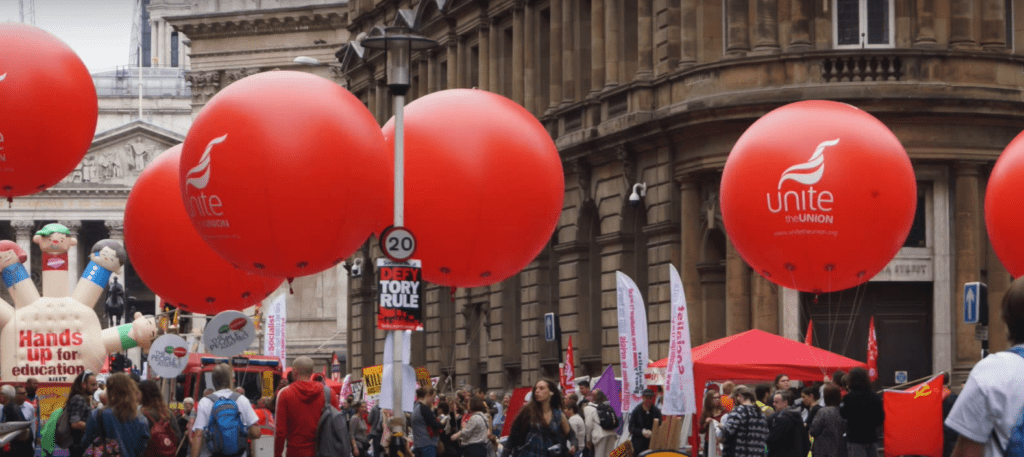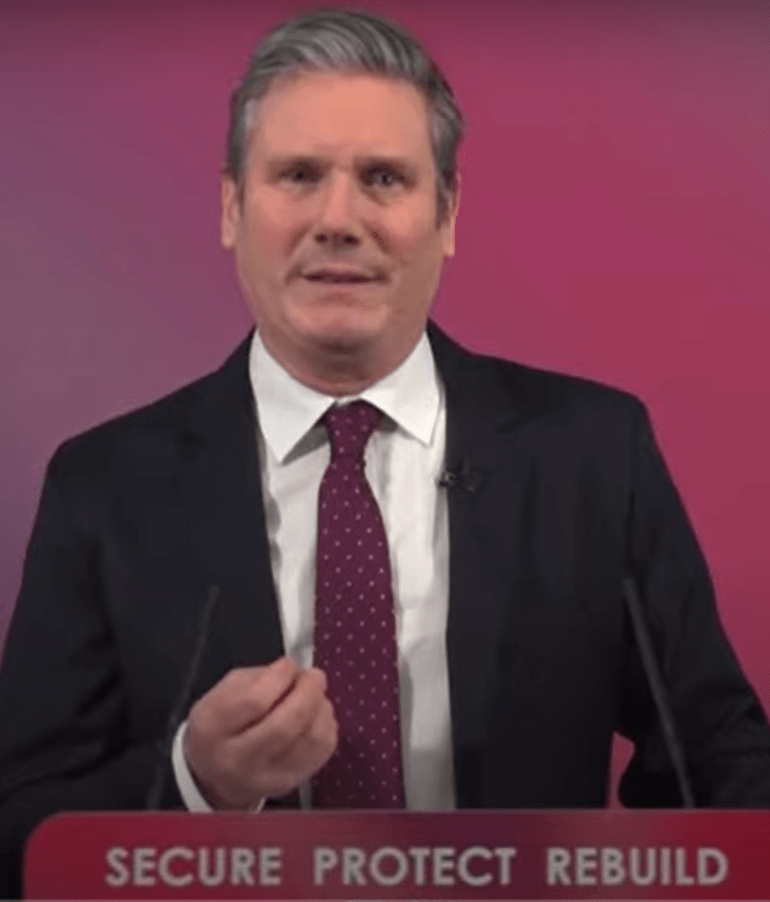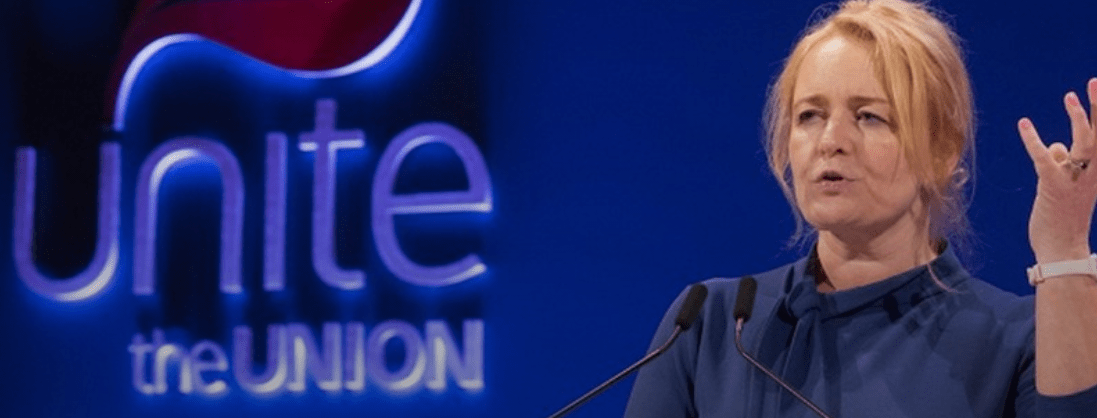Unite the union, the largest affiliate to the Labour Party and the largest single source of its funds, has a new general secretary. Sharon Graham was elected last week, with nearly 38% of the total vote against nearly 34% for her nearest rival, Steve Turner.
The first thing that has to be said about this election is that it represents a serious defeat for the right-wing candidate, Gerard Coyne. Not only did he come third, but in a slightly larger turnout of voting members, he lost nearly 18,000 votes compared to his support in the last election in 2017. Granted that 2017 was mostly a two-horse race between him and Len McCluskey, but nevertheless Coyne was the favoured candidate of the Tory press and Labour’s right wing this time around, too, and the collapse of his vote, from over 47% to just over 28%, cannot go unremarked.
Important subterranean forces at work
It is a stark indication, as we have argued, that the right wing of the labour movement, both in the trade union and in the political field, have nothing to offer ordinary trade union members and working people in general.
The second point that needs to be made is that the election shows that there are important ‘subterranean’ forces at work in that union, and more than likely in other unions as well, which are not always apparent on the surface. Graham’s election was a surprise to many on the left, not least to this website, but what seems to have been the case is that her appeal to rebuild the union from the workplace upwards found an echo among members.

From anecdotal reports since the number of nominations was released, it seems that many of Sharon Graham’s came from large, healthy, workplace branches, in contrast to inactive branches. As we wrote in June, “It is a poor reflection of the Unite left in general that so many branches are moribund and are effectively propped up by officials. Some of these half-dead branches are still used by officials to ‘nominate’ their favourite candidates”.
It is also possible, given the utter lack of leadership from Keir Starmer, that Graham’s anti-political stance, in dialling down the significance of Unite’s affiliation with and participation in the Labour Party, found an echo among many members. On the other hand, her advocacy of stronger workplace and industrial action – including so-called ‘leverage’ campaigns – has stood her in good stead.
A general secretary more accessible to members
In taking up her post the day after the result was announced, Graham has pledged to completely “refocus” the union to concentrate of jobs, pay and working conditions. She has moved the office of the general secretary from the seventh to the first floor, to make herself “more accessible” to members and is apparently arranging for a hotline to be installed in her office for members to contact her. “I will be a general secretary for the workers, for my members,” she said in an interview.
According to a report in the Guardian, she has said that she was “in talks with unions in Germany and the US – Amazon’s other major markets – to effectively form a global union campaign that would “pincer” Amazon and force it to allow workers to organise themselves more freely”.
Workers should not pay for the Covid pandemic
She is planning a much more vigorous campaign around the union’s claim for NHS staff and, it is reported, will liaise with other health unions. This could very well have the result, not so much as ‘liaising’ as putting pressure on the other union leaderships to adopt a more militant approach.
As regards the effects of the Covid pandemic in general, she has argued, “I will be trying to use everything in my power to stop workers paying the price of the pandemic, just as they did after the 2008 financial crash.”
If all of these post-election comments were carried to union members during the election campaign, it goes a long way to explain Graham’s victory. More to the point, if it is put into effect, it marks a significant development, and potentially the most important shift in the leadership of a major trade union for decades.
Arm’s length approach to Labour
But what about the effect of the Graham victory on the Labour Party? In our original editorial on the election, in which we backed Steve Turner, we wrote the following:
“Although there are some good left members of the union who support Sharon Graham, having got fewer than a quarter of the total nominations, she is unlikely to beat Gerard Coyne and, in any case, some of her campaign slogans leave a lot to be desired. Her main slogan, “Let’s get back to the workplace” sounds good in practice, but she has adopted what can only be described as an “anti-political” stance…”
In suggesting that Steve Turner was in a stronger position to beat Gerard Coyne, we were wrong, and we hold our hands up to that. The supporters of Sharon Graham clearly knew something that we didn’t know. On the other hand, we stand by our comments about the dangers of trying to be ‘anti-political’ in the modern world.
As important as it is to build up the industrial strength of the union, there is a vital role for the organisation to play in fighting for its members’ interests on the political front. Not to recognise that, is to fly in the face of real life.

It remains to be seen, therefore, how Sharon Graham’s election will affect developments in the Labour Party and how she will view the wholesale shift to the right under Starmer. On the one hand, Labour’s right wing, notwithstanding the drubbing received by their favoured candidate, might welcome an arm’s-length approach to the Party, in the hope of it enabling the right to get on with their destructive agenda. But on the other hand, Labour’s front bench would not in a million years support a more aggressive and militant approach to winning industrial disputes.
Current Labour leaders hold the union in contempt
The current Labour leadership are contemptuous of the trade union movement, always happy to take their money, but ever reluctant to back them in action. The Labour leadership’s treatment of the president of the Bakers, Food and Allied Workers Union, Ian Hodson, is a case in point. Expelled from membership on the most spurious pretext, it is no surprise that BFAWU is now going to discuss disaffiliation, after more than a hundred years of being a central part of the Labour Party.
The disaffiliation of a trade union would be water off a duck’s back for Labour’s right wing who, in any case, have always aimed to break the historic Labour-trade union link. But for socialists in the Party, the treatment of Hodson is a disgrace and any subsequent disaffiliation would be a tragedy.
As for Unite, it is unlikely that the union would disaffiliate from the Labour Party, at least in the short-term, so it remains to be seen what the upshot will be of Sharon Graham’s ‘disengagement’ from it. Given the left-wing domination of the union’s National Executive Committee and much of its official apparatus, we would hope that the union continues to play a part in holding the line and, indeed, fighting back against the relentless shift to the right in the Party.



